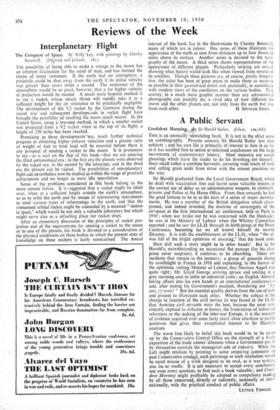A Public Servant
Confident Morning. #y Sir Harold Butler. (Faber. it is: 6d.) THIS is an unusually stimulating book. It is not in the strict sense an autobiography. Persons concern Sir Harold Butler less than subjects ; and his own life is primarily of interest to him in so fat as it has enabled him to arrive at informed conclusions on the large movements of contemporary history. Most' memoirs are casual gleanings which leave the reader to do his threshing for himself: these recall rather a combine harvester, covering wide tracts of land and setting grain aside from straw with the utmost precision on the way.
Sir Harold graduated from the Local Government Board, where he dealt with vaccination fees and learnt some valuable lessons in the correct use of delay as an administrative weapon, to criminals, prisons and Police at the Home Office. From then onwards he had the good fortune to be in at the start of a series of major develop- ments. He was a member of the British delegation which cham- pioned, and indeed invented, the doctrine of sovereignty of the air-space at the first international air conference, held in Paris in 1910; when war broke out he was concerned with the blockade ; he was at the Ministry of Labour when the Whitley Committee reported ; and he saw the I.L.O. through its birth-pangs at the Peace Conference, becoming (as we all know) himself its second Director. It is with the establishment of the I.L.O., when "the air was full of the bright optimism of morning," that the book ends.
How dull such a story might be in other hands! But in Sir Harold's, notwithstanding an occasional flat passage (for his clear prose never surprises), it contrives to be absorbing. There are incidents that remain in the memory: a group of generals dining by candlelight in France in 1918 and explaining, to the horror of the optimistic visiting Minister of Labour, that Norman Angell was quite right ; Mr. Lloyd, George arriving spruce and smiling in a grey morning coat to settle an industrial crisis ; an English Admiral taking affairs into his own hands at an international conference— and, after stating his Government's position, thundering out "J'y suis, fy reste! " But the essential quality derives from the use of past and present to illuminate each other. Whether the subject is the change in function of the civil service (it was found at the I.L.O. that Austrian civil servants were the best, because the most con- sistently exposed to criticism at home), the frustrations of industrial reformers or the making of the inter-war Europe, it is the mastery of evidence acquired over some forty years' close attention to public questions that gives their exceptional interest to Sir Harold's analyses.
The worst fate likely to befall this book would be to be taken up by the Conservative Central Office on the strength of a lively exposition of the trade unions' dilemma when a Government put in by themselves controls the managerial side of industry. While the Left might retaliate by pointing to some unsparing comments on past Conservative conchict, such patronage or such retaliation would be equal misuse of a work designed to be read, as it was written, sine ira ac studio. It is pot necessary to accept every conclusion, nor even every question, to find such a book valuable ; and Confi- dent Morning might profitably be adopted as compulsory reading by all those concerned, directly or indirectly, nationally or inter- nationally, with the practical conduct of public affairs.
LETTICE FOWLER.


















































 Previous page
Previous page